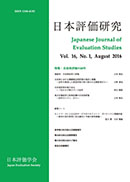Volume 16, Issue 1
Displaying 1-5 of 5 articles from this issue
- |<
- <
- 1
- >
- >|
Special Issue: Two Decades of Evaluation Practices in the Japanese Local Governments
-
2016 Volume 16 Issue 1 Pages 1-2
Published: August 31, 2016
Released on J-STAGE: June 01, 2023
Download PDF (1194K) -
2016 Volume 16 Issue 1 Pages 3-16
Published: August 31, 2016
Released on J-STAGE: June 01, 2023
Download PDF (1261K) -
2016 Volume 16 Issue 1 Pages 17-30
Published: August 31, 2016
Released on J-STAGE: June 01, 2023
Download PDF (1403K) -
2016 Volume 16 Issue 1 Pages 31-45
Published: August 31, 2016
Released on J-STAGE: June 01, 2023
Download PDF (1785K)
Research notes
-
2016 Volume 16 Issue 1 Pages 47-61
Published: August 31, 2016
Released on J-STAGE: June 01, 2023
Download PDF (1281K)
- |<
- <
- 1
- >
- >|
